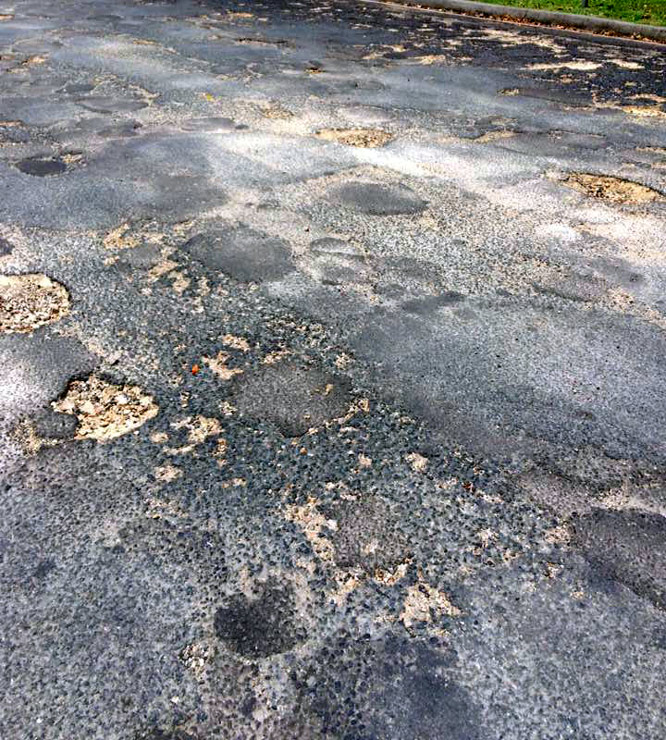AFTER WEEKS of heavy rainfall and flooding many roads within Byron Shire are heavily pot-holed and falling apart.
Roads that were built many years ago on poor alignments and on poor sub-base, were never going to withstand such a harsh climate and intensification of vehicular traffic. Chronic under-funding of essential road maintenance and renewal by successive councils has well and truly come home to roost.
Council General Manager, Ken Gainger, said that the Council has been facing and dealing with the harsh reality that the only way to fix the pot holes is to reconstruct many kilometres of sealed roads across the shire – an expensive solution at $715,000 per kilometre.
“A band aide approach of cyclic pot-hole repair is a road to nowhere” Mr Gainger said.
“It is for this reason that the Council had no alternative but to push for a special rate rise through the Independent Pricing and Regulatory Tribunal (IPART) in order to make significant in-roads into the Council’s inherited infrastructure renewal back-log.
“This was a tough decision for the elected Council to make and it is a credit to them that they recognized the significance of the roads problem and took what they knew would be an unpopular decision,” he said.
Mr Gainger assured ratepayers that the additional revenue generated through the special rate increase would be dedicated to infrastructure renewal – this was a condition of the IPART approval and the expenditure each year will be audited by the Auditor General.
The Council will place its annual road works schedule on its web site so that the community can see which roads will be re-constructed and renewed across the Shire and when.
This is all part of the Council wanting to be open and transparent in its decision-making and being more respectful to its community.
Mr Gainger said that roads selected for upgrading were not chosen based on political or community advocacy imperatives but rather they were selected as part of a sophisticated strategic asset management approach which analyses and prioritises works based on their condition, usage and expected lifespan.
“Council understands the community’s frustration with the current unsatisfactory state of our roads and has already increased annual roads expenditure from $4M in 2012 to $16M in 2016.
“Council asks that people be a little patient with the increasing number of potholes following recent heavy rains – pot holes can’t be properly repaired until the wet weather subsides but rest assured that we are putting on extra crews to do this urgent work.
“Hopefully our residents can see the efforts that we are making to provide roads that better meet community expectations,” Mr Gainger said.
Works are continuing on large roads projects across the Shire including a new two lane roundabout at Sunrise Boulevard on Ewingsdale Road, repairs to the Belongil Creek Bridge, and with a tender about to be advertised for a new two lane roundabout at the Ewingsdale Road/Bayshore Drive intersection at the Byron Industrial Estate.
Council is also moving closer to being in a position to construct the Byron Bay Town Centre Bypass following its successful defence of a recent Land and Environment Court appeal against the Development Consent issued by the Joint Regional Planning Panel (JRPP) by some Butler Street residents.
Mr Gainger said that Council was actively lobbying the NSW State Government for further roads funding and was pursuing legislative change that would (a) support the collection of a bed tax from visitors to the area staying in Byron accommodation facilities; and (b) enabling Council to charge business rates for holiday let establishments.
“If our lobbying is successful the additional revenue created would help to ease the burden of ratepayers in funding infrastructure damaged by two million tourists each year,” he noted.

Yes, so true Beth Shelley and this can be seen in Don Page’s parliamentary speech 2004 when MP for Ballina, in defence of our train service from Casino to Mur-bah! The statements that endorsed the need and viability of the train service was numerous and I have listed them, sent to Crs and many others who should be carefully noting those statements but for, let’s say – some unknown reason – those statements are deliberately ignored – just tossed aside. Jillian Spring
If govts had been sensible and kept passengers and freight moving on a regular commuter rail service there wouldn’t be this much damage at all. Trucks and buses are 50 times heavier than cars but don’t pay for the damage they cause. Ratepayers are subsidising the trucking companies hugely.